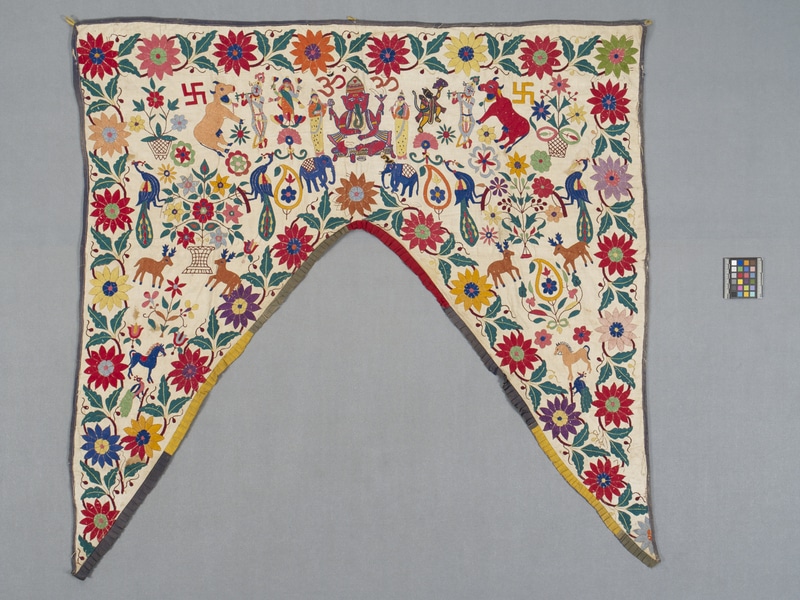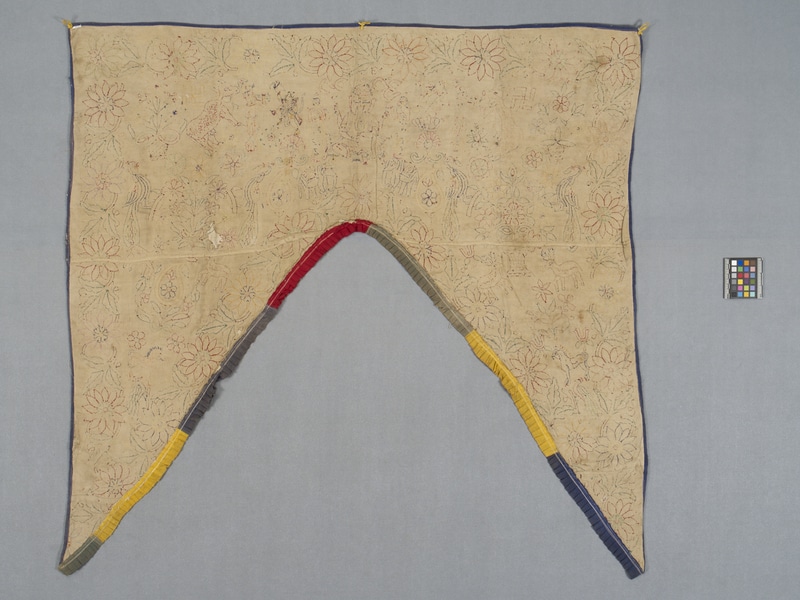Door Hanging Item Number: 2878/60 from the MOA: University of British Columbia


Description
Swallowtail-shaped, embroidered fabric panel. The base fabric of this is light white-brown cotton with course cotton lining of the same colour. There is dark blue piping across the entire top and outer edges of the hanging, and the inner edge (under which you would walk) is rimmed with alternating yellow, red, blue and green ruffles. Around the edge of the hanging on the inside of the piping and ruffles there are embroidered flowers on a vine in varying colours, the most predominant of which are red, green, blue, and yellow. The middle of each flower is a contrasting or opposite colour to the petals and the centre of the flower is a smaller circle in either the colour of the petals or a third contrasting colour. The flowers are done in a herringbone or chain stitch. There are many figures depicted on the hanging including elephants, peacocks, horses, deer, cows, flower pots bursting with flowers, swastika sun symbols, mango fruits, the Sanskrit letter “Aum”, the Monkey god Hanuman, the goddess of wealth Lakshmi, Lord Krishna and his consort Radha and in the centre is the Hindu elephant god Ganesh.
Narrative
This toran was embroidered by a Boricha Ahir woman, a sub-group of the Hindu Ahir tribal group in Kutch District. Pieces like this are typically made for a celebratory community event like a wedding. The Ahirs trace their origins to a close connection to the Yadava Rajputs, the group to whom Lord Krishna is alleged to have belonged, thus the Ahirs pay great reverence to Krishna, who is frequently depicted on their costumes and household articles. On this toran there are two images of Lord Krishna playing his flute embroidered onto each side of the panel. Many elements of this toran are typical of the Boricha Ahir style. The Hindu elephant god Ganesha sits on a throne at the centre apex of this panel so that everyone passing underneath this hanging attached to a doorway will receive Ganesh's blessing (very important to Hindus before undertaking a journey).
Item History
- Made in Gujarat, India
- Collected in Ahmadabad, Gujarat, India during 1981
- Owned by Tamarin Productions Inc. before May 4, 2011
- Received from Tamarin Productions Inc. (Seller) and Ruth Read Bequest (Funding source) on May 4, 2011
What
- Name
- Door Hanging
- Identification Number
- 2878/60
- Type of Item
- hanging
- Material
- cotton fibre
- Overall
- height 110.5 cm, width 114.5 cm
Who
- Culture
- Gujarati ?
- Previous Owner
- Tamarin Productions Inc.
- Received from
- Tamarin Productions Inc. (Seller) and Ruth Read Bequest (Funding source)
Where
When
- Collection Date
- during 1981
- Ownership Date
- before May 4, 2011
- Acquisition Date
- on May 4, 2011
Other
- Item Classes
- textiles
- Condition
- fair
- Accession Number
- 2878/0060